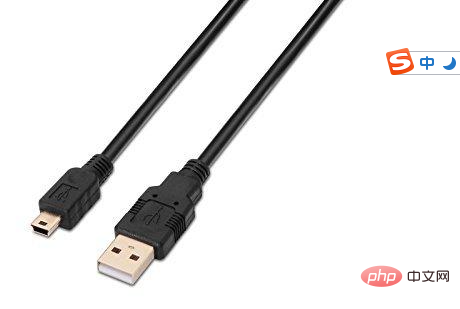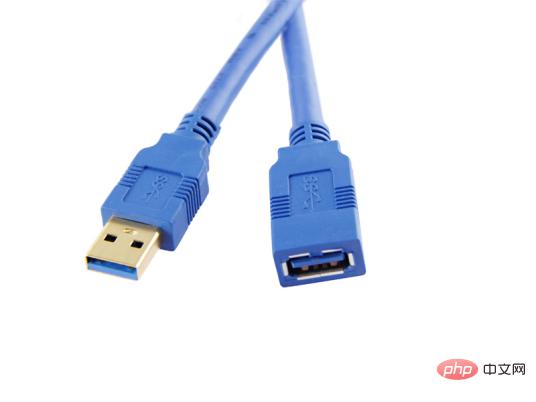What is the speed of usb2.0 and 3.0
Theoretically, the transmission speed of USB1.1 can reach 12Mbps/second, while USB2.0 can reach the speed of 480Mbps/second (60MB/s); USB3.0 is the latest USB specification, characterized by the transmission rate Very fast, the maximum transmission speed can reach 5.0Gbps/second (500MB/s). USB3.0 is 10 times faster than the current 480Mbps USB2.0, its appearance is basically the same as the current USB interface, and it is compatible with USB 2.0 and USB 1.1 devices.

The operating environment of this tutorial: Windows 7 system, Dell G3 computer.
USB, the abbreviation of English Universal Serial Bus, is an external bus standard used to standardize the connection and communication between computers and external devices. It is an interface technology applied in the PC field.
What is USB 2.0?
USB2.0 (Universal Serial Bus2.0, Universal Serial Bus) is a new interface technology used in the computer field. The USB interface has the characteristics of faster transmission speed, support for hot swapping and connection of multiple devices. It has been widely used in various types of external equipment. There are four (five) types of USB interfaces: USB1.1, USB2.0, USB3.0 and USB3.1 (3.1Gen 1 and 3.1Gen 2).

Theoretically, the transmission speed of USB1.1 can reach 12Mbps/second, while USB2.0 can reach the speed of 480Mbps/second (i.e. 60MB/s), and can Compatible with USB1.1.
USB2.0 is several times faster than USB1.1, but it requires driver cooperation! The USB port and USB peripherals on the motherboard are required to be USB2.0 in order to achieve the working speed of USB2.0. As long as If one is not USB2.0, it will work in USB1.1 state.
What is USB 3.0?
USB 3.0 is the latest USB specification. This specification is mainly initiated by industry giants such as Intel, Microsoft, HP, Texas Instruments, NEC, and ST-NXP. It is characterized by very fast transmission rates and can theoretically It reaches 5.0Gbps/second (500MB/s), which is 10 times faster than the current 480Mbps High Speed USB (referred to as USB 2.0). The appearance is basically the same as the current USB interface, and it is compatible with USB 2.0 and USB 1.1 devices.

Extended information:
The reason why USB 3.0 has "super speed" performance is entirely due to technological improvements.
Compared with the USB 2.0 interface, USB 3.0 adds more parallel mode physical buses.
You can pick up a USB cable nearby and look at the interface part.
Based on the original 4-wire structure (power, ground, 2 data), USB 3.0 adds 4 more lines for receiving and transmitting signals.
So there are a total of 8 lines, whether in the cable or on the interface.
It is the additional 4 (2 pairs) lines that provide the bandwidth required by "SuperSpeed USB" to achieve "super speed".
Obviously 2 (1 pair) lines on USB 2.0 are not enough.
In addition, the signal transmission method still uses host control, but it is changed to asynchronous transmission.
USB 3.0 utilizes a bidirectional data transmission mode, instead of the half-duplex mode of the USB 2.0 era. Simply put, data only needs to flow in one direction, which simplifies the time consumption caused by waiting.
In fact, USB 3.0 does not adopt any advanced technology that is rarely heard of, but it theoretically increases the bandwidth by 10 times. Therefore, it is more approachable and friendly. Once SuperSpeed USB products come out, more people can easily accept them and make better customized products.
If you want to read more related articles, please visit PHP Chinese website! !
The above is the detailed content of What is the speed of usb2.0 and 3.0. For more information, please follow other related articles on the PHP Chinese website!

Hot AI Tools

Undresser.AI Undress
AI-powered app for creating realistic nude photos

AI Clothes Remover
Online AI tool for removing clothes from photos.

Undress AI Tool
Undress images for free

Clothoff.io
AI clothes remover

AI Hentai Generator
Generate AI Hentai for free.

Hot Article

Hot Tools

Notepad++7.3.1
Easy-to-use and free code editor

SublimeText3 Chinese version
Chinese version, very easy to use

Zend Studio 13.0.1
Powerful PHP integrated development environment

Dreamweaver CS6
Visual web development tools

SublimeText3 Mac version
God-level code editing software (SublimeText3)

Hot Topics
 1378
1378
 52
52
 How to create and set up a USB security key on Windows 11
Sep 16, 2023 am 11:29 AM
How to create and set up a USB security key on Windows 11
Sep 16, 2023 am 11:29 AM
Protecting your PC from unauthorized access is crucial if you want to protect your files and personal data, which is why many people want to create a USB security key on Windows 11. This is the most secure authentication method, and in today's guide, we'll show you how to set it up properly on your PC. Benefits of Using USB Security Keys on Windows 11 Physical security keys provide the most secure two-factor authentication. They are immune to phishing attacks because they do not use an internet connection. Security keys protect your Windows accounts and most online accounts. Many security keys are compatible with Windows Hello. How to create mine from scratch on Windows 11
 USB to HDMI adapter not working properly on Windows 11/10
Feb 19, 2024 pm 12:00 PM
USB to HDMI adapter not working properly on Windows 11/10
Feb 19, 2024 pm 12:00 PM
If you're having issues with your USB to HDMI adapter not working properly on Windows, it could be because of an outdated graphics card driver or a problem with the adapter itself. The following content will help you resolve this dilemma. Fix USB to HDMI adapter not working on Windows 11/10 Use the following solutions to fix USB to HDMI adapter not working on Windows 10/11: Update Display Adapter Driver Rollback Graphics Driver Unplug and Plug USB to HDMI Adapter Updated BIOS Let's get started. 1] Update Display Adapter Driver Issues may be caused by outdated or corrupted display adapter drivers. You can try downloading from the official website of the manufacturer
 9 Ways to Connect iPhone to Mac Without USB
Feb 02, 2024 pm 04:09 PM
9 Ways to Connect iPhone to Mac Without USB
Feb 02, 2024 pm 04:09 PM
The iPhone and Mac are two devices with different purposes, but with the integration of the Apple ecosystem, you get a unified user experience no matter which device you choose. If you have both an iPhone and a Mac and want to connect them without using a USB cable, the following can help you achieve this. Connecting iPhone and Mac without USB: Requirements Before connecting iPhone and Mac, the following requirements need to be met to ensure the connection works without problems: iPhone running the latest version of iOS Mac running the latest version of macOS Valid AppleID account iPhone and Macs can connect to wireless networks and/or Bee on iPhones
 Please update your device settings to accept media transfers
Feb 19, 2024 pm 12:24 PM
Please update your device settings to accept media transfers
Feb 19, 2024 pm 12:24 PM
We will show you how to fix media transfer error when connecting your phone to PC via USB cable. When you try to import photos and videos from your phone to your computer, you may encounter a "Please update your device's settings to accept media transfers" error message displayed by the Photos app. Please update your device settings to accept media transfers Update your device settings to allow media transfers to resolve the error message. Restart your two devices Use different USB cables Check your Android phone settings Install the MTP USB device driver Use other methods to transfer your photos and videos Let’s get started. 1] Restart both devices It is recommended that you first try to restart your devices, including computers and phones, when you encounter a temporary failure. Heavy
 Tips to solve the problem of insufficient and unstable USB port voltage on WIN10 computer
Mar 27, 2024 pm 10:41 PM
Tips to solve the problem of insufficient and unstable USB port voltage on WIN10 computer
Mar 27, 2024 pm 10:41 PM
1. On the computer desktop, right-click [This PC]. 2. On the pop-up menu, click [Properties]. 3. After entering the [System] page, click [Device Manager] on the left. 4. In the [Device Manager] list box, find [Universal Serial Bus Controller] and double-click (or click [>] on the left). 5. After expanding the [Universal Serial Bus Controller] list, right-click the item labeled [Hub] or [Hub]. 6. In the pop-up menu, click [Properties]. 7. On the [USBRootHub Properties] page, click the [Power Management] tab. 8. After opening the [Power Management] page, click the box or [Allow the computer to turn off this device to save power (A)] to uncheck the box. 9. [Allow the computer to turn off this device
 What is the speed of usb2.0 and 3.0
Jan 19, 2021 am 11:22 AM
What is the speed of usb2.0 and 3.0
Jan 19, 2021 am 11:22 AM
Theoretically, the transmission speed of USB1.1 can reach 12Mbps/s, while USB2.0 can reach a speed of 480Mbps/s (60MB/s); USB3.0 is the latest USB specification, which is characterized by a very fast transfer rate and a maximum transfer speed Can reach 5.0Gbps/second (500MB/s). USB3.0 is 10 times faster than the current 480Mbps USB2.0, its appearance is basically the same as the current USB interface, and it is compatible with USB 2.0 and USB 1.1 devices.
 Win10USB driver installation detailed steps sharing
Dec 27, 2023 am 10:29 AM
Win10USB driver installation detailed steps sharing
Dec 27, 2023 am 10:29 AM
More and more people are using the Win10 system, and driver installation is also a common problem during the use of the system. So how to install the USB driver of win10? Let’s see how the editor does it. I hope it can help you! How to install win10usb driver: 1. First download and install the driver wizard software. 2. After opening, the software will automatically detect the driver installation status of the computer. 3. Then wait for the detection to complete and click "Driver". 4. After clicking the driver again, it will enter the "standard mode" by default. Find the USB driver that needs to be installed, and then click to download. 5. Wait for the driver download to complete. 6. After the driver download is completed, click "Install". 7. Click Install and wait for the driver to be installed.
 What brand of charger does lovesn have?
Oct 12, 2022 pm 03:00 PM
What brand of charger does lovesn have?
Oct 12, 2022 pm 03:00 PM
lovesn is a Haiyun brand charger. Haiyun Lovesn smart USB charger, the official model is C20, can provide 5V, 2.1A output, and is compatible with wide voltage charging from 100 to 240v; the characteristic of Haiyun charger is that it can detect the device being charged through the built-in smart chip It can automatically adjust its output current, fundamentally improve the battery life of the device being charged, and shorten the charging time of the device being charged.



